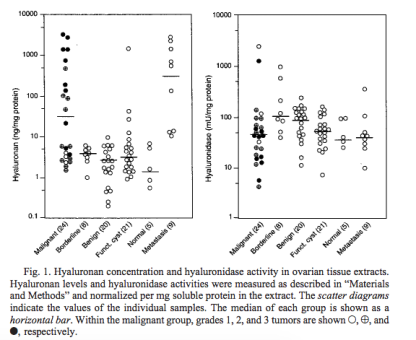Hyaluronic acid (sometimes referred to as hyaluronan) is found naturally in the skin where it serves a number of biological functions, including helping prevent dry skin by binding water molecules. Most people are probably familiar with hyaluronic acid as a common component of skin care products and facial serums. Hyaluronic acid also typically exist as a polymer, with numerous hyaluronic acids linked together, often in chains of thousands of molecules. More on this shortly.

Hyaluronic acid, or HA, may provide benefits if ingested. Some studies suggest taking HA as an oral supplement has skin hydrating properties. Additionally, one randomized, double-blinded trial found an improvement in facial skin wrinkles following 12 weeks of a longer chain (but not a shorter chain) hyaluronic acid supplement.

Additional evidence has also reported oral HA supplements seem to help with knee joint pain, with a 2016 review article reporting positive effects of oral HA supplements on knee pain in over 10 clinical trials. While this evidence is somewhat preliminary, HA seems to be a supplement many individuals use for these purported skin and joint benefits. But is there a risk to taking HA as a supplement?
It has been observed that HA is often elevated in tissues where cancer is present, including cancers of the lung, breast, prostate, and ovary and in many cases hyaluronic acid levels correlate with the severity of these cancers. One small study, for example, found normal ovaries had HA levels of 1.6 ng/mL while more serious, grade 3 ovarian tumors had HA levels of 196.6 ng/mL.

Does this mean hyaluronic acid contributes to cancer growth? As mentioned previously, HA exists in chains. These chains can be highly variable in their length and this length seems to influence some of their biological effects. Shorter chains of HA, for example, seem to promote pro-cancer pathways (this also explains why enzymes called hyaluronidases, which can break up longer HA chains into shorter chains, seem occasionally implicated in cancer).
Longer chains of HA, on the other hand, may actually be protective against cancer. Naked Mole Rats are constant sources of scientific examination due to their remarkable ability to live much longer than other rodents. Part of their longevity seems to stem from their resistance to cancer.

A 2013 study reported a key part of these creature’s cancer resistance comes from hyaluronic acid. Specifically, the fact that, in addition to having more HA, the HA produced in their body exists in massively long chains. When their ability to make such long chains of HA was removed they become susceptible to cancer.
So what does this mean for HA supplements? In essence, longer chain, or “high molecular weight” HA supplements may be preferable. However, their remains some debate as to whether HA is broken down into shorter chain in the digestive tract before absorption or by hyaluronidases inside the body, so until further research is conducted I recommend some caution regarding HA supplements if cancer is a concern.